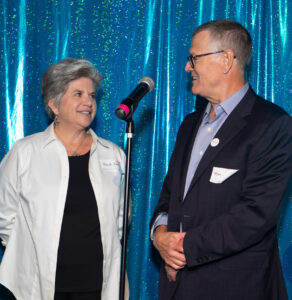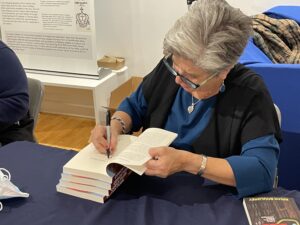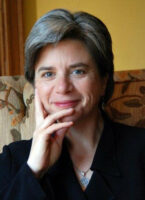Welcoming Our New Executive Director, Julie Justicz
Legal Council for Health Justice is thrilled to welcome our new Executive Director, Julie Justicz, to our team. With extensive experience in disability law and non-profit consulting, Julie brings a wealth of knowledge and energy to our organization.
We sat down with Julie to gain deeper insight into her journey to Legal Council, her hopes for the future of the organization, and her passions.
Julie, we’re so excited to have you at Legal Council, but this is far from your first experience with our organization! You were the Executive Director of Legal Council for Health Justice—then AIDS Legal Council of Chicago—from 1995 to 1997. What excites you about returning to the organization? How has the scope of this work changed over the years?
Returning to Legal Council for Health Justice more than 25 years after my first stint as Executive Director is both humbling and exciting. Humbling because I realize today what I didn’t know back then. While I was passionate about addressing the HIV health crisis that devastated Chicago communities during the 1980s and 1990s, I had limited understanding of managing a nonprofit organization. So, I am excited to return to a leadership role with more than a few years of experience in development, nonprofit management, and policy advocacy work. I am excited to learn from and support an incredibly talented team at LCHJ. I’m also eager to work with an energetic and creative board of directors.
Our work today is broader in scope: we coordinate multiple Medical Legal Partnerships, helping children with disabilities and folks who are unhoused and battling mental health and substance use disorders, in addition to our long-standing work with the LGBTQ community addressing HIV/AIDS. We want to ensure access to healthcare, housing, and income security for people facing complex health issues. We know that healthcare barriers disproportionately impact people of color and individuals with limited income, and we have the expertise, clarity of focus, and resolve to help our clients and community partners achieve their goals.

Julie and former Executive Director, Tom Yates, at Legal Council’s 2023 Summer Soirée.
Although you have only been at Legal Council for just shy of one month, what are some priorities for work or opportunities for growth you have already identified?
I’m honored to follow Tom Yates—a well-known and highly respected leader for his legal expertise, trustworthiness, and dedication to healthcare equity. So, I come into my role with great deference to the work he has led here. I want to build on all of LCHJ’s successes and also listen to staff to identify their priorities and concerns. I anticipate working together to implement the excellent strategic plan the organization developed in 2022-2023, particularly addressing issues of staff, leadership, and board diversity, equity, and inclusion. It is so important to hold space for conversations around racial equity and economic justice—particularly as it impacts the clients and communities we staff. I want to help develop and implement an effective framework and cadence for continuing individual and collective learning around DEI; I want to focus on hiring, developing, and retaining a high-performing, diverse staff.
You’re very right—there is so much success to build on, and so much room for opportunity still. Now, along a similar vein, Chicago has obviously made great strides toward providing residents the resources and support they need to live healthy lives, but there is always work to do to achieve true health justice in our city. What energizes you about this work and gives you hope for the future?
We know that many factors impact health and wellness: social and economic environments, as well as the physical environment. Yes, all people need access to medical homes and caring healthcare providers. But outside of access to medical care, social determinants of health include a wide array of factors, such as where people live, the safety of the water they drink, the air they breathe, the roads they walk along or drive on, the stores, parks, libraries in their community. It can be daunting to look at healthcare statistics for our city and realize that life expectancy for people of color has declined over the past decade. Black people have a life expectancy of 8.8 years less than white people. In fact, the mortality for everyone except white, non-Hispanic people has increased in the past ten years. But we have to find a way to find hope and opportunity in those numbers.
What energizes me is the fact that Chicago is now looking more deliberately at addressing upstream drivers of health and wellness: factors like access to more affordable housing, better education, expanded Medicaid coverage, and insurance protections, in addition to whether someone has a primary care physician. While COVID hit our City hard and disproportionately, it did show us what we can do when we work across agencies and systems to ensure that people have roofs over their heads (moratorium on eviction), and ongoing Medicaid coverage. We do have the resources to improve outcomes; we need to work better across divides—listening directly to community members and organizations in hard-hit areas to address upstream healthcare determinants.

Julie signing copies of her new book, Conch Pearl, at a book signing event in October 2023.
You have a great perspective on and understanding of the city, but you have not always lived here. You were born in England and then lived in the Bahamas for many years. Tell us more about that! How do you think your upbringing has contributed to your passion for this work and vision for Legal Council?
I was born in a tiny town in Worcestershire, called (non-ironically) Great Witley. I had a lovely, bucolic childhood living with my parents, my six brothers, and many animals; we spent most days outdoors to help my mother stay sane. My youngest brother, Robert, was born with a chromosomal anomaly called Partial Monosomy 21, resulting in him having significant physical and intellectual disabilities and frequent, intractable seizures. As a well-resourced and intact family, we nonetheless struggled to get Robert the medical care he needed, the education services he required, not to mention any respite care or support for my parents. I think that knowing and loving Robert was a big factor in my desire to work in disability law. In addition, during my college and law school years, I had several friends who died from AIDS. I saw how government indifference resulted in unnecessary deaths and how brave and thoughtful activism led to policy changes that saved lives. I knew I wanted to dedicate my professional life to addressing health and disability issues.

Julie’s new book, Conch Pearl, is available for purchase now.
Thank you for sharing. It’s clear that your commitment to this work is unwavering. We know how important it is to take time away from work to avoid burnout; you are an avid runner, and also an author. In fact, your second book was just published this month – congratulations! Where does your interest in writing stem from? How do you find or delegate time to your passions?
Thank you – it’s a very exciting time! Reading fiction has been my lifelong passion, and I suppose that writing is how I make sense of the world. As a reader, I am frequently drawn to first-person narratives: Sing, Unburied, Sing, by Jesmyn Ward, The Brief Wondrous Life of Oscar Wao by Junot Diaz. Something about the makeshift intelligence of a young narrative trying to figure out a world that is not always fair or kind moves me.
At the same time, as a writer, I like to examine different points of view: it’s my fairness factor, I suppose. What does this other character have to say? How does their perspective differ from the first person’s POV? I like to look at stories (and life) from many sides, and writing helps me do that—with the goal of finding and sharing some deeper/more elusive understanding than a quick first take. And where do I find the time to write? I think of writing like training for a marathon; you have to have a training plan and you have to show up and put in the work. It’s arduous and boring sometimes, and sometimes you’re running high, in the zone. But you don’t get to finish a marathon or a novel if you don’t show up every day and put in the work. My first novel, Degrees of Difficulty, took me about 10 years to finish! My new novel, Conch Pearl, took about half as long . . . meanwhile, my marathon times get slower every year.


